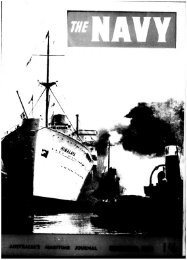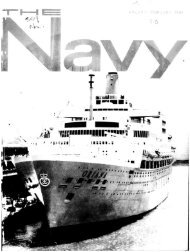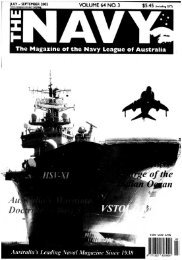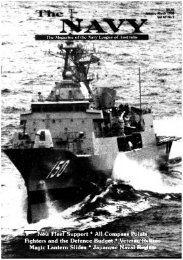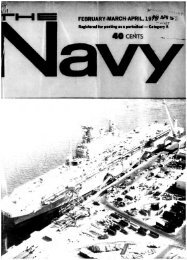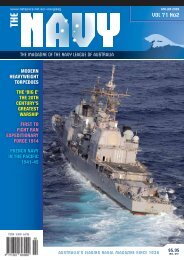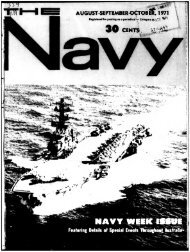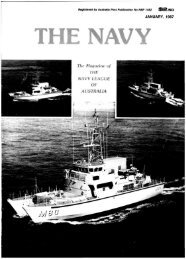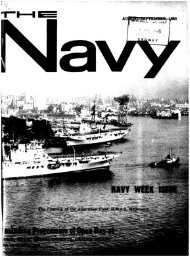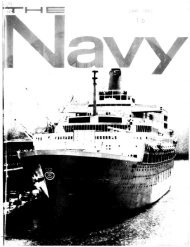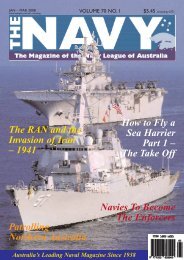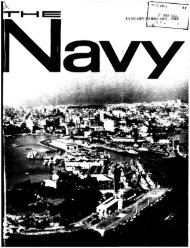The Navy Vol_73_No_4 Oct 2011 - Navy League of Australia
The Navy Vol_73_No_4 Oct 2011 - Navy League of Australia
The Navy Vol_73_No_4 Oct 2011 - Navy League of Australia
You also want an ePaper? Increase the reach of your titles
YUMPU automatically turns print PDFs into web optimized ePapers that Google loves.
STRONGER SHIPPING . . . CONTINUEDLABOUR PRODUCTIVITY REFORM<strong>The</strong> final element <strong>of</strong> the reform package is labour productivity.We are committed to aligning <strong>Australia</strong>n productivity practices withthe best in the world. To do this, we will need a compact betweenindustry and unions. I have previously said this compact must includechanges to work practices, a review <strong>of</strong> safe manning levels and theuse <strong>of</strong> riding gangs on coastal vessels. This compact is essential tothe reform agenda.I am aware that negotiations between industry and the unionsare progressing.2012 START DATEEarlier I said that any meaningful reform must be bold and decisive.<strong>The</strong> new package is bold.<strong>No</strong>w for the decisive.When I announced the Government’s election commitment torevitalise <strong>Australia</strong>n shipping I said it would be in place by mid-2013.However, in the time we have been working on this major reformpackage we have seen more vessels leave our shores. <strong>The</strong> need toarrest this decline, combined with the hard work and focus givenby all involved, has convinced the Government to bring forward thisreform to commence on 1 July 2012.THE BROADER SHIPPING INDUSTRYREFORM AGENDAWhile we have been developing the coastal shipping reforms, we havenot been idle in other maritime areas.National RegulatorAt the last COAG meeting the Prime Minister got the States andTerritories to agree to the establishment <strong>of</strong> a single national safetybody — something that has not been achieved in the 110 years sinceFederation.This will greatly decrease the burden <strong>of</strong> red tape, increase regulatoryconfidence, remove inconsistency in the law applying to <strong>Australia</strong>ncommercial vessels and streamline new maritime safety plans.By 2013 <strong>Australia</strong> will have one maritime safety regulator the<strong>Australia</strong>n Maritime Safety Authority - and one law - Commonwealthlaw - applying to all commercial vessels in <strong>Australia</strong>n waters.Protection <strong>of</strong> the Marine Environment<strong>Australia</strong> imposes high safety standards on ships to protect ourenvironment.However, in recent times our precious reefs and coastlines have beenput in jeopardy by two major incidents involving foreign flagged ships– the Pacific Adventurer oil spill and the Shen Neng 1 grounding.To increase protection for our precious marine waters, we haverecently extended the ship tracking system (REEFVTS) to cover theentire Great Barrier Reef. All large ships must regularly report theirlocation and route and their progress will also be tracked by radio andsatellite 24/7.But our efforts to protect the Reef don’t stop there. I will soon beintroducing into Parliament legislation toughening penalties forbreaches <strong>of</strong> our maritime and environmental laws.CONCLUSIONThis is a huge reform agenda and clearly shows the Government’scommitment to revitalising <strong>Australia</strong>n shipping.In conclusion I want to state the obvious — and that is that it makesno sense, no sense at all for <strong>Australia</strong>n trading to take place almostentirely in the hulls <strong>of</strong> foreign ships.• We need to become participants, not just customers.• We need to upgrade the fleet.• We need to get the regulatory framework right.• We need a “best in class” tax system for shipping.And we need a pool <strong>of</strong> skilled seafarers to operate the ships <strong>of</strong>the future.<strong>The</strong>se reforms will confirm <strong>Australia</strong>’s long term economic,environmental and security objectives.Navigation Act RewriteWe are currently rewriting the Navigation Act 1912 to providecontemporary and robust regulation for maritime safety.<strong>The</strong> Act is outdated and requires modernisation to better reflectcurrent regulatory policies.It needs to be more flexible in responding to changes in national andinternational safety standards.It will contain a new penalty and enforcement regime.We aim to have the new legislation finalised by the middle <strong>of</strong>next year.26 THE NAVY VOL. <strong>73</strong> NO. 4



